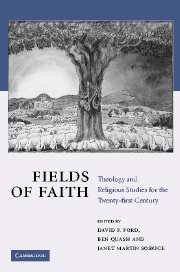Book contents
- Frontmatter
- Contents
- Notes on contributors
- Introduction
- PART I THE END OF THE ENLIGHTENMENT'S NEUTRAL GROUND
- 1 The study of religion and the rise of atheism: conflict or confirmation?
- 2 Doing Theology in the university
- 3 Shaping the field: a transatlantic perspective
- 4 The study of religion as corrective reading
- PART II MEETINGS ON MUTUAL GROUND
- RESPONSE
- Index of names
- Subject index
2 - Doing Theology in the university
Published online by Cambridge University Press: 22 September 2009
- Frontmatter
- Contents
- Notes on contributors
- Introduction
- PART I THE END OF THE ENLIGHTENMENT'S NEUTRAL GROUND
- 1 The study of religion and the rise of atheism: conflict or confirmation?
- 2 Doing Theology in the university
- 3 Shaping the field: a transatlantic perspective
- 4 The study of religion as corrective reading
- PART II MEETINGS ON MUTUAL GROUND
- RESPONSE
- Index of names
- Subject index
Summary
Let me be bold for the sake of brevity: I do not think there is any such discipline as ‘Religious Studies’. Nor do I think that we ought to go on pretending that there is. Saying which, of course, places me at odds with the current state of academic play in the matter of curricular organisation of our subject in most universities in the United Kingdom: how we do it troubles me not a little. On the whole, in the United Kingdom we deal with this matter administratively as we deal with many other cases, by means of a sort of resolute lack of resolve, by means of a determined refusal of theoretical consistency: in short, by means of shameless fudge.
Here is the problem, put in plain terms: our subject-discipline originated as ‘Theology’. And we still do something called by that name, by which we mean, most of us, something you do within, and possibly out of, a credal commitment; also for many of us theology is done in the first instance in its connections with an ecclesial community. And if we are not caused to wonder by hostile critics, we may wonder for ourselves whether a discipline so apparently in thrall to credal and ecclesial commitments can justify its place within the university.
- Type
- Chapter
- Information
- Fields of FaithTheology and Religious Studies for the Twenty-first Century, pp. 25 - 38Publisher: Cambridge University PressPrint publication year: 2005
- 4
- Cited by



